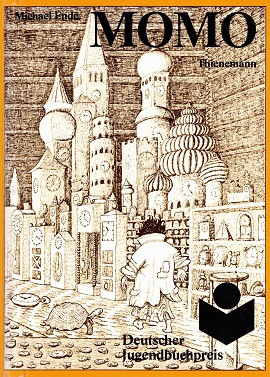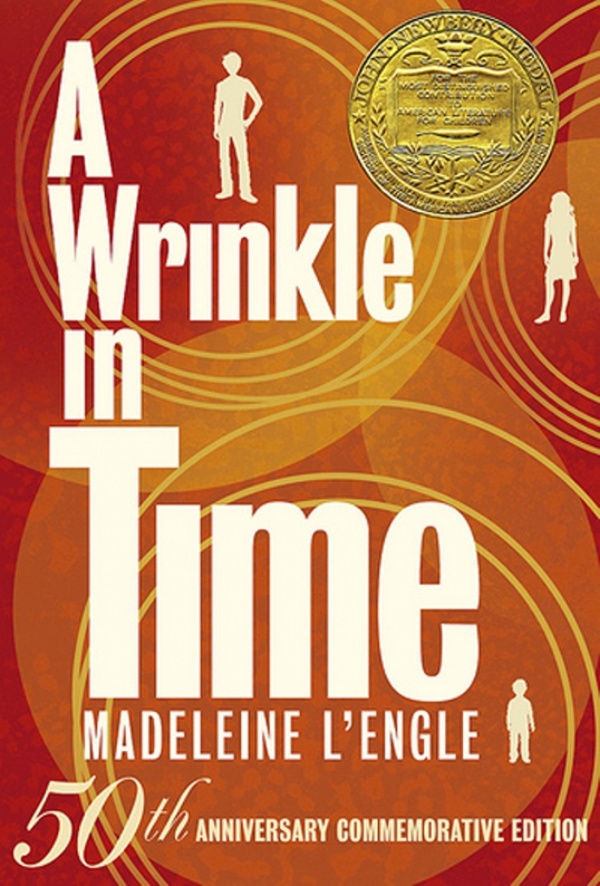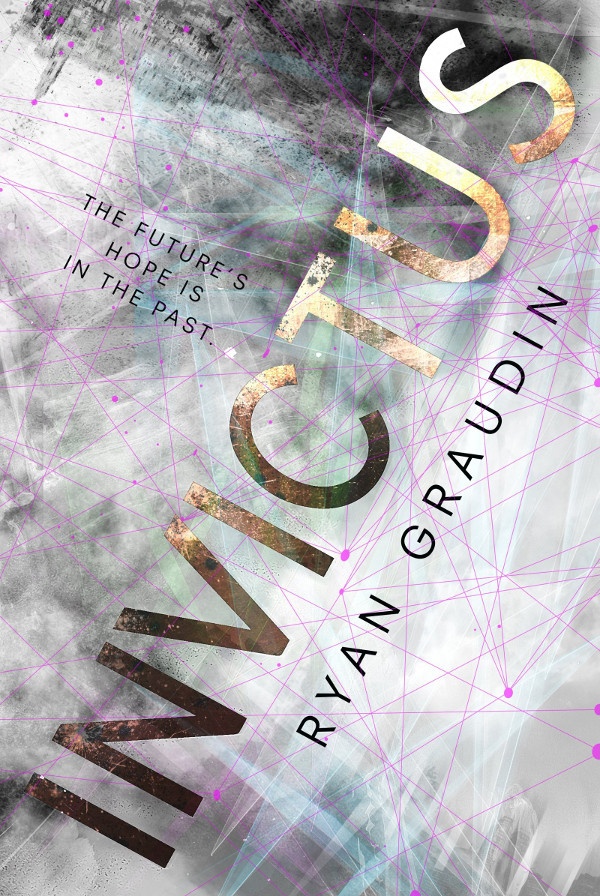
About the Book
-
Authors:
- Michael Ende
- Lukas Zwirner
- Genres:
- Classics
- Fantasy
- Middle Grade
- Translations
Cover Story: Good Day, Miss
BFF Charm: Platinum
Talky Talk: Take Your Time
Bonus Factors: Coach Taylor Award, Loyal Pets, Big Questions
Factor: Real World Issues
Relationship Status: Time Well Spent
Cover Story: Good Day, Miss
This cover is cute but inaccurate. The little girl is too tidy to be believable as the homeless title character, and the gray men doffing their hats to her look ridiculously harmless, considering that they’re the villains of the story. I much prefer the original German cover, which shows an accurate image of Momo (messy hair and oversized clothes, like the book describes her) and captures the surreal atmosphere of the Nowhere House:

The Deal:
A close-knit, eccentric group of neighbors in an unnamed Italian city find a girl named Momo living in the ruins of an ancient Roman amphitheater. Since she is afraid of institutions, they decide that instead of reporting her, they can fix up the ruin to make it livable and take care of her together. In return, she also takes care of them, as she is a deeply empathetic person who inspires them to be better just by listening (think Guinan from Star Trek: The Next Generation). However, the city in which they live is being secretly taken over by agents of the Timesaving Bank: non-human, parasitic beings who appear as cigar-smoking men in gray business suits and live by stealing time. When Momo’s friends fall victim to the gray men’s exploitation, she will have to use all the empathy and strength she has to save them.
BFF Charm: Platinum

What wouldn’t I give to talk to someone with Momo’s listening ability? This is how the author describes it:
“She merely sat and listened with the utmost attention and sympathy, fixing her large dark eyes on them. And when they finally stumbled upon an idea that they had never even dreamt of before, they felt like it had come from deep within them.”
She’s not perfect – she’s timid and indecisive – but you can’t blame her when the gray men threaten to isolate her from everyone she cares about. When she stands up to them, even under what amounts to psychological torture, I let out a silent cheer. I love a strong female character as well as the next reader, but that doesn’t have to mean guns blazing. Sometimes it means sticking to your convictions even when you’re curled up on the ground.
Also, someone needs to feed her, get her clothes that fit, and find her a safer place to live than a crumbling old ruin.
Swoonworthy Scale: 1
Since Momo is a child – her friends guess her age to be twelve at most – there is no romantic plotline for her. Her friend Gigi tells her a story in which characters named after the two of them get married and live happily ever after, but in a completely innocent tone. The adult characters’ love lives stay mostly in the background, although there was one breakup that still broke my heart in just a few sentences. No, Fusi, you idiot, it is not a waste of time to date a paraplegic woman, no matter what the gray man told you. If her smile when you bring her flowers means that much, go back to her already.
Talky Talk: Take Your Time
Since this is a story about time and the importance of living in the moment, it’s only fitting for it to unfold slowly. Momo’s life with her friends – the games they play, the stories they tell, the arguments she mediates with her quiet presence – are described in such loving detail that when this life is endangered by the time agents, you really feel it. It’s not rushed, but never boring; there are some tense confrontations and chase scenes that keep me up at night even after the hundredth time reading it.
Zwirner’s translation is well done for the most part. It’s very literal, which means it’s faithful to the original, but sometimes sounds a bit strange. Firstly, the word “rufen” (to call out/ exclaim) is often translated as “yell”, which makes for a lot of yelling at unsuitable moments. Secondly, every time the gray men refer to Momo as “the child”, which is a gender-neutral noun in German, in English they call her “it”. Since they really do see humans as livestock, though, it makes a creepy kind of sense. Also, the English version of Gigi’s protest song made me cringe:
“So wake on up and hear us whine:
The men in gray are stealing time!”
Ouch … But, to be fair, translating poetry is hard work, and it’s not as if I could do any better. I might be overly critical, but only because Michael Ende’s original German prose has been my gold standard since I was old enough to read.
Bonus Factor: Coach Taylor Award

Momo’s closest friends are a dreamy young storyteller named Gigi who considers her his muse, and an old man named Beppo who overthinks his conversations so much that only Momo has enough patience to listen to him. They are poor themselves – Beppo lives in a cardboard shack – but they do their best to provide for her, teaching her to read and bringing her food. When she tells them she’s been threatened by a gray-faced man who emanates a deadly cold and registers as nothingness to her listening power, Gigi and Beppo believe her, even rallying the neighborhood on her behalf. I won’t spoil what happens later, but the sacrifices these guys make for their little girl are enough to make you cry.
Honorable mention goes to Master Secundus Minutius Hora, immortal caretaker of time. Besides playing a pivotal role in the last few chapters, he answers Momo’s questions, treats her with respect, and (last but not least) serves her a hearty breakfast.
Bonus Factor: Loyal Pets

Cassiopeia the turtle, Master Hora’s familiar, is one of my favorite parts of this book. She sees half an hour (“exactly half an hour”) into the future, communicates by making glowing letters appear on her shell, and gives Momo advice and encouragement when she needs it most. She’s a mystery that the author never quite explains, but what’s a fantasy story without a bit of mystery in it?
Bonus Factor: Big Questions

“What exactly is time?” Momo asks Master Hora when they first meet, and it’s a question worth thinking about. Michael Ende never outgrew the childlike habit of taking nothing for granted, which is why his books are for all ages.
“Calendars and clocks exist to measure time, but that signifies little because we all know that an hour can seem as eternity or pass in a flash, according to how we spend it.
Time is life itself, and life exists in the heart. ”
Factor: Real World Issues

As much as I love this book, this is the first time I’ve read it in years. The older I get, the more the gray men scare me. Even though they’re fictional, the time-saving mindset they represent is all too real.
When a police officer ignores a report of a missing child because the child has no official residence, when a man neglects his loved ones and burns himself out at work, when therapists gaslight a patient instead of helping, when someone feels lonely enough to doubt their will to live, and when people get so dependent on something poisonous they can’t exist without it (don’t ask me what the gray men’s cigars are made of), there’s no use blaming supernatural forces because humans do these things all on their own.
But unless (or until) a caretaker of time intercedes for us, we can still do what Momo does, even for her enemies: listen.
Relationship Status: Time Well Spent
It’s been a long while since I’ve read you, but I’m glad I did, fitful sleep and all. I’d give you the time from my heart any day.
Literary Matchmaking

A Wrinkle In Time by Madeleine L’Engle is another mind-bending adventure with a strong heroine, wise guardians and a terrifying villain.

Invictus by Ryan Graudin features more time-related, universe-saving escapades with a loyal bunch of misfits based in Italy.

Cemetery Boys by Aidan Thomas also uses fantasy elements to talk about the problems of homeless youth, but in a more mature way.
FTC Full Disclosure: I received no compensation for this review. Momo is available now.